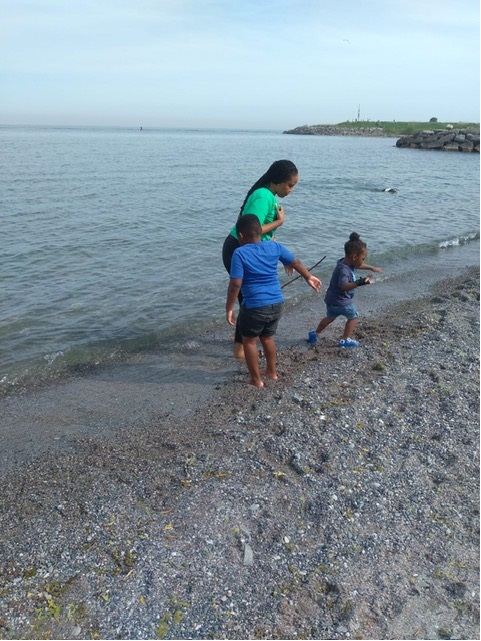If you or someone you know is experiencing intimate partner violence, call the 24/7 toll-free Assaulted Women’s Helpline at 1-866-863-0511, or visit sheltersafe.ca to find an emergency shelter near you.

For more than two decades, Andrine Johnson spent her everyday masquerading in front of loved ones.
“I played that strong face… because I didn’t want anyone to know,” she said.
Behind closed doors, the teen mother of two at the time says she endured financial, emotional, and physical abuse from multiple partners.
Too scared of what would happen if she called the police on her Black partners, she says she was coerced by her abusers to live in silence.
“It was very heart wrenching. Very fearful. There was just no escape,” she said.
Sometimes, she says, all it took was one word for a situation to escalate.
“I remember getting battered during my pregnancy. I remember getting my head bashed into a wall. Getting kicked.”
Johnson recalls an argument with her partner where she used the word “stupid.” The next thing she remembers is waking up in the hospital with a broken nose.
When she was questioned by concerned doctors and family members, she was prepared with an excuse.
“When they asked me who did it, I lied. I said ‘Oh I got jumped by a bunch of girls.’ ”
Trouble didn’t wind down during the holidays. Johnson would avoid hosting gatherings in her own home to keep her experience of abuse a secret.

After a ‘heart wrenching’ number of years, which included delivering a premature baby girl who later died, Johnson saw her smile had visibly faded.

Get breaking National news
Looking in the mirror one day, she had her mind set on a goal that would later become her motivation to flee.
“I want my smile back,” she thought.
Nearly half a decade since she walked away from her last abuser, Johnson sat in her office recounting her story.
As she spoke with a firm and unwavering voice, she thought of other women who don’t dare speak of their abuse at all.
For people who are still living with their abusers, the holidays can sometimes lead to situations that boil over.
“During this time of year, we have seen an increase in calls, an increase in violence,” said Carla Neto, executive director at Women’s Habitat of Etobicoke.
Neto says daily crisis calls to their organization have doubled this December.
There’s also been an influx of women looking to stay at their shelter, which has been full for a while.
Intimate partner violence, Neto says, happens year round. However, more victims happen to report these incidents during the holidays.
Advocates say there’s a number of reasons that come up time and time again.
Financial stress is a big one.

“We’re hearing from survivors that the increased cost in living is resulting in abusers using the circumstances to manipulate women and coerce them to do certain things in order to get access to financial resources,” said Priya Shastri, director of programs at Woman Abuse Council of Toronto.
That stress could be magnified as a result of expenses such as having to buy gifts.
Societal pressures, like having to host or attend events, could also contribute to the rise in reported violence around the holidays, Shastri said.
This may often lead survivors to decrease interactions with family and friends, or avoid gatherings altogether, and instead isolate themselves.
“Who wants to go to a Christmas dinner and have to explain why you have bruises? ” said Neto.
Problematic substance use and increased time indoors with abusers, also contributes to the problem, Shastri said.
During the first 15 days of December, Toronto Police received 689 reports of intimate partner violence.
That’s already more than 90 per cent of incidents reported in the entirety of last December, which saw 757 reports for the month.
The total number of incidents reported to TPS so far this year is 17,312.
That number doesn’t surprise advocates, but they say it doesn’t come near telling the full story.
According to the most recent data from Statistics Canada, 80 per cent of victims of domestic violence don’t report the incidents to police.
Meaning the majority of victims, 79 per cent of whom are women, suffer in silence.
The fear of speaking out, says Shastri, is a big reason why its important for the public to recognize the signs of gender-based violence long before physical abuse begins.
“Some of the things you might see is a level of social isolation occurring. So, individuals cancelling on events. You might see expressions of anxiety, nervousness, depression.”
Johnson says she knew she had to stay alive for her daughter.
“I didn’t want to become a statistic,” she said.
When she finally mustered the courage to flee, Johnson found refuge at a woman’s shelter.
Working three jobs to eventually secure her own accommodations, she remembers how dismissive employees of other social services were to her needs.
They assumed that, as a Black woman, she was somehow tougher than others and less likely to be on the receiving end of violence.
“It was dehumanizing,” she recounted.
Now the CEO of Embrave, an organization supporting survivors of gender-based violence in Peel region, Johnson and her team are carving out a path to safety for survivors that her younger self struggled to secure.
Making survivors feel dignified when they ask for help is her way of trying to end the cycle of retraumatization that women go through when they finally muster up the courage to flee.
Her other form of giving back , she says, includes sharing her story, to be ‘a voice for the voiceless.’
While her journey in lending a helping hand to other survivors is far from over, Johnson told Global News she did manage to put a nagging goal to rest.
“I got my smile back.”









Comments
Want to discuss? Please read our Commenting Policy first.